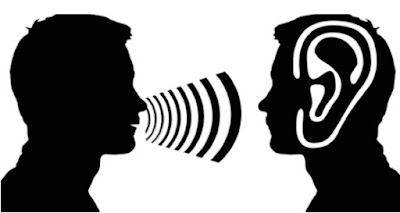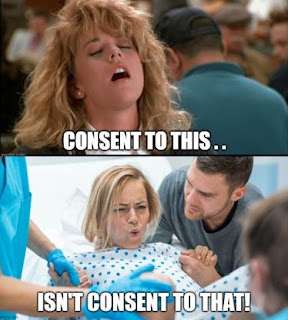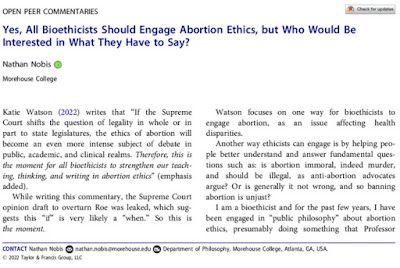Yes, all bioethicists should engage abortion ethics, but who would be interested in what they have to say?
Open peer commentary for the American Journal of Bioethics on a set of articles about abortion.
Nathan Nobis (2022) Yes, All Bioethicists Should Engage Abortion Ethics, but Who Would Be Interested in What They Have to Say?, The American Journal of Bioethics, 22:8, 33-36, DOI: 10.1080/15265161.2022.2089274 [some number of free eprints here]
1500 words.
Katie Watson (2022) writes that “If the Supreme Court shifts the question of legality in whole or in part to state legislatures, the ethics of abortion will become an even more intense subject of debate in public, academic, and clinical realms. Therefore, this is the moment for all bioethicists to strengthen our teaching, thinking, and writing in abortion ethics” (emphasis added).
While writing this commentary, the Supreme Court opinion draft to overturn Roe was leaked, which suggests this “if” is very likely a “when.” So this is the moment.
Watson focuses on one way for bioethicists to engage abortion, as an issue affecting health disparities.
Another way ethicists can engage is by helping people better understand and answer fundamental questions such as: is abortion immoral, indeed murder, and should be illegal, as anti-abortion advocates argue? Or is generally it not wrong, and so banning abortion is unjust?
I am a bioethicist and for the past few years, I have been engaged in “public philosophy” about abortion ethics, presumably doing something that Professor Watson would encourage bioethicists to do. On the basis of my experience, I want to report this: few people, especially pro-choice people—including their leaders and organizations—seem to care about or have any interest in what ethicists have to say about abortion.
Is this a problem?
It’s hard to guess what, realistically, the best impact ethicists could have, and could have had, on political and legal debates about abortion. But a safe assessment is this: people, especially pro-choice people, not listening to ethicists and not seeking to better understand the ethical issues about abortion is not helping anyone.
Persuading broader audiences that ethicists might be able to help advance pro-choice causes is thereby essential to implementing Watson’s suggestion that bioethicists get more engaged. What good ethicists might do depends on others taking advantage of what they have to offer: that this would need to happen is my focus here.
* * *
To say a bit about my experience, I have been engaging the public using a co-authored (with Kristina Grob) freely available, open-access introductory book, Thinking Critically About Abortion (2019) (available at AbortionArguments.com, reposted many other places, also a $5.38 paperback), blog posts on further questions and misunderstandings, articles in three ethics anthologies (2020), articles in publications like Salon (2021, 2022) and Areo (2019), videos on YouTube and TikTok, discussions on podcasts and in public forums, and more.
These materials are not “pro-choice cheerleading” or any form of partisan hackery. They support a pro-choice perspective, but they critique bad arguments and misunderstandings from both anti-abortion and pro-choice perspectives and acknowledge insights from both “sides”: abortion critics are correct in some of their claims, even if their overall position is not supported by good arguments.
My basic motivation for this ethics-educational outreach is this:
legal attempts to ban and restrict abortion are primarily motivated by the moral outlook that abortion is murder, a human-rights violation, and unjust;
but, there are no good reasons to believe that, in general, abortion is wrong: the arguments that are given to think this, especially the simplistic arguments that most anti-abortion advocates actually appeal to, are demonstrably poor arguments; and good arguments can be given for a broadly pro-choice position;
so, more people knowing this and understanding why this is so this might do some good in helping to undercut legal efforts against abortion: some anti-abortion advocates might lose confidence in their views; pro-choice people would be better able to explain and justify their own views; there would be positive effects for the moderate middle majority.
None of these educational efforts would, in themselves, “solve” the tangible legal and political challenges against abortion. But they could do some good and so are worth trying, especially since not doing this does not appear to be working out well, from pro-choice perspectives.
Since a root of anti-abortion legal efforts are the moral claims of murder and injustice, it makes sense to explain why these claims are not supported by strong arguments and why a broadly pro-choice view is supported by better arguments. At least 80% of trained philosophers (PhilPapers survey 2020) seem to agree with these judgments, but few ethicists—even those who are recognized experts on the topic—are engaged in public discussions of abortion: in contrast, there are many highly visible anti-abortion intellectuals who regularly engage the public on the issues. This might give a false impression that the anti-abortion case is stronger when, in fact, it is weaker: ethicists working to correct anyone’s mistaken impressions here might help.
* * *
To share the reactions to my ethics-educational activities, I have gotten many encouraging and appreciative responses from people from all around the world who report learning a lot from these educational materials. I have also gotten a lot of appreciation for my (usually!?) calm, fair, respectful, and friendly ways of engaging these issues since insults, anger, and hate seem to be common in discussions of abortion.
[Engaging abortion debates has steered my interests toward understanding the impact of various cognitive biases, like confirmation bias and motivated reasoning, tribalism, cults, groupthink, echo chambers, epistemic bubbles, the denial of expertise, and other social and personal influences that usually preclude and distort understanding and responsible inquiry. Abortion is a useful topic to study how we can better think about controversial issues in general, and help identify what our parts can be to enable and encourage better dialogue and discussion of all issues. (Note: I cut this paragraph from the final version)].
I have, however, gotten a lot of negative reactions, including from pro-choice people, which leads me to my observation that most vocal pro-choice people do not care about engaging abortion ethics: they believe that abortion is obviously not wrong and that anyone who thinks otherwise is ignorant, ill-motivated, or evil. Some pro-choicers argue it’s offensive to engage people who disagree, claiming that’s like arguing with slaveholders, but forgetting that arguments were given against slavery, which contributed to positive change.
Abortion-advocacy organizations also appear to have zero interest in engaging in anything about ethics: indeed, they actively avoid the issues. Mary Ziegler (2020) reports in a The Atlantic article that, since the 1990s, pro-choice advocates have deliberately avoided engaging ethical questions about abortion; they have focused solely on the legal freedom to choose abortion.
We don’t know what would have happened if pro-choice organizations had attempted to duplicate the types of ethics-education efforts that anti-abortion advocates have engaged in for decades (e.g., trainings, books, “apologetics”): perhaps we’d be in the same place we are now.
If the “let’s avoid ethics” strategy was based on the assumption that the legal right to abortion could not be lost, that is turning out to be a mistaken assumption. Some pro-choice people appear to have this sort of outlook: “We don’t care about ethics, or your ethics; we have the legal right to have abortions and that’s all that matters!” This attitude can work, until that legal right is challenged and, perhaps, lost.
In sum, enthusiastic pro-choice advocates tend to think it’s simply and obviously not wrong and should be legal, and so so have little interest in insights from ethicists on how to better understand, present and, perhaps, move their ethical message. But it does not appear that not attempting to undermine the, or a, root cause of the legal attacks—the belief that abortion is a great evil—has helped: the pro-choice cause is not better off for not engaging in ethics education.
* * *
I will conclude with some observations of common misunderstandings of the issues, which might help ethicists better engage abortion in a variety of forums.
Of course, both sides often offer “bumper sticker” slogans in favor of their position that are just question-begging assumptions of their own views. Beyond that:
anti-abortion advocates:
tend to accept a naive “scientism” that contributes to their thinking that the scientific facts that fetuses are biologically alive, biologically human, and biologically human organisms simply entails that abortion is wrong;
tend to not realize, and actively deny, that people sometimes mean different things by “human beings” and “when life begins”;
tend to be ignorant of the fact that what makes anyone (or anything) have moral rights, or be otherwise wrong to kill, is a hard, theoretical question, and the best candidates for better explanations here do not include simply that the being is biologically human or even that the being is a biologically human organism;
tend to not think about whether or how the right to life could be a right to someone else’s body, and related issues; and:
pro-choice advocates:
often mistakenly assume that the case against abortion is merely religious: they do not know abortion foes often see abortion as a “human rights” violation, which is a misunderstanding that results, in part, from human rights advocates poorly stating their views;
too often deny that fetuses are “alive” or “life” and “human” and so appear ignorant since fetuses clearly are that in a biological sense;
often mistakenly assume that anyone’s lacking a (moral or legal) right to anyone else’s body simply settles the issue;
often assume that abortion restrictions are motivated by the goal of controlling women and not motivated by the belief that abortion is murder: even if this is true, the ethical task of undercutting their arguments and giving better arguments might do more good than not (Jolly 2022).
In sum, the basic questions are these: what do pro-choice efforts have to lose in engaging ethics, with ethicists? Nothing. What do they, we, have to gain? Potentially a lot, and so ethics demands engaging ethics, with ethicists.
Citations
Grob, Kristina and Nobis, Nathan. “Defining ‘Abortion’ and Critiquing Common Arguments about Abortion.” In Fischer, Bob. College Ethics: A Reader on Moral Issues that Affect You, 2nd Ed. Oxford University Press. 2020.
Jolly, K.S. “The Feminist Case for Debating Abortion Ethics.” DefendingFeminism.com. May 5, 2022. https://defendingfeminism.com/2022/05/05/the-feminist-case-for-debating-abortion-ethics/
Nobis, Nathan and Grob, Kristina. Thinking Critically About Abortion: Why Most Abortions Aren’t Wrong and Why All Abortions Should be Legal. Open Philosophy Press. 2019. http://www.AbortionArguments.com
Nobis, Nathan and Grob, Kristina. “Abortion and Soundbites: Why Pro-Choice Arguments Are Harder to Make.” Areo Magazine. July 23, 2019. https://areomagazine.com/2019/07/23/abortion-and-soundbites-why-pro-choice-arguments-are-harder-to-make/
Nobis, Nathan and Dudley, Jonathan. “Why the case against abortion is weak, ethically speaking.” Salon. April 11, 2021. https://www.salon.com/2021/04/11/why-the-case-against-abortion-is-weak-ethically-speaking/
Nobis, Nathan. “I’m a philosophy professor. The argument for making abortion illegal is illogical.” Salon. December 4, 2021. https://www.salon.com/2021/12/04/logic-arguments-abortion-rights/
Nobis, Nathan. “When does ‘life’ begin? When it comes to abortion, it depends on what you mean by ‘life.’” Salon. April 2, 2022. https://www.salon.com/2022/04/02/when-does-life-begin-when-it-comes-to-abortion-it-depends-on-what-you-mean-by-life/
PhilPapers. “Survey Results: Abortion.” PhilPapers 2020 Survey. https://survey2020.philpeople.org/survey/results/4974
Watson, Katie. “The Ethics of Access: Reframing the Need for Abortion Care as a Health Disparity.” American Journal of Bioethics. 2022.
Ziegler, Mary. “How Raphael Warnock Came to Be an Abortion-Rights Outlier.” The Atlantic. December 31, 2020. https://www.theatlantic.com/ideas/archive/2020/12/liberal-religion-abortion/617491/






